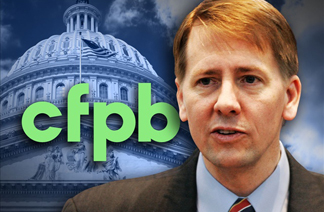BofA ordered to pay $1.3 billion over Countrywide lending program
by E. Scott Reckard, Los Angeles Times

A New York judge ordered Bank of America to pay nearly $1.3 billion in penalties in a civil fraud case involving a mortgage program that Countrywide had nicknamed “the hustle,” which fast-tracked the processing of mortgage applications. After a monthlong trial, a jury decided last fall that BofA and Countrywide were liable for selling thousands of bad loans to Fannie Mae and Freddie Mac. The lending program fast-tracked mortgage applications from August 2007 through May 2008. Shortly thereafter, Bank of America bought Countrywide, the nation’s largest home lender at the time. Read More ›
PG&E accused of obstructing justice in San Bruno blast probe
by Jaxon Van Derbeken, San Francisco Chronicle

A federal grand jury indicted PG&E Tuesday on a total of 28 counts stemming from the San Bruno natural-gas explosion that killed eight people and destroyed 38 homes. The utility could be punished by fines of as much as $1.3 billion, based on its profit associated with the alleged criminal conduct. That would be on top of $2.5 billion in possible penalties associated with state regulatory violations. Read More ›
GI Bill loophole keeps 4 major for-profit educators from violating law
by Aaron Glantz, Center for Investigative Reporting
Senate investigators found eight of the top 10 recipients of GI Bill funds were for-profit colleges. In addition, the report said, “the amount of taxpayer dollars paying for veterans to attend for-profit colleges meanwhile has skyrocketed from $640 million in the 2009-10 school year to $1.7 billion last year.” The University of Phoenix’s San Diego campus has received more GI Bill money than any brick-and-mortar campus in America. The school’s overall graduation rate is less than 15 percent, according to the U.S. Department of Education. Read More ›
Nation’s top 10 consumer complaints
by Consumer Federation of America and the North American Consumer Protection Investigators, press release

Do-not-call violations and other telemarketing abuses were the fastest-growing complaints in 2013, according to the latest annual survey of state and local consumer protection agencies conducted by Consumer Federation of America and the North American Consumer Protection Investigators. CFA and the NACPI surveyed general-purpose consumer protection agencies at the city, county and state level to indentify the top 10 types of complaints, the fastest-growing, and the worst (admittedly a judgment call), as well as consumer agencies’ biggest achievements and challenges. Read More ›
San Bruno mayor wants top official removed from blast probe
by Jaxon Van Derbeken, San Francisco Chronicle

California Public Utilities Commission President Michael Peevey should be removed in light of San Bruno explosion-related emails that show state officials are “subject to undue influence” by PG&E and the CPUC “is corrupted.” Mayor Jim Ruane also called on Peevey to be removed as head of regulatory proceedings into whether PG&E should be fined more than $2 billion for safety violations related to the explosion. San Bruno officials filed a complaint against PG&E for “knowingly and intentionally attempting to illegally influence the outcome” of cases related to the 2010 disaster. Read More ›
Survey: Most smartphone owners support kill switch; industry lobbyists remain opposed
by Jonah Owen Lamb, The San Francisco Examiner

With Senate Bill 962 (Leno) set to go to the Assembly floor Aug. 7, a majority of the public – 99 percent – backs laws requiring shut-off technology in smartphones to combat thefts. “The companies that make 97 percent of smartphones sold in the U.S. have removed their opposition to the bill, yet [CTIA-The Wireless Association] remains opposed,” Max Szabo of the San Francisco District Attorney’s Office said. “It raises the question of whether these insurance giants are hiding behind this lobbying group in an attempt to protect the profits they’re reaping at the expense of public safety.” Read More ›
The CFPB has only just begun tackling financial services in its first four years
by Ashlee Kieler, Consumerist

Four years ago, the Consumer Financial Protection Bureau was created as a safeguard to ensure the financial industry followed the rules when selling products and services to consumers – and a lot has happened since that time. From returning billions of dollars to consumers who were wrong by financial services to holding for-profit colleges accountable for their deceptions, the work of the CFPB has touched many areas of the financial world and it continues to expand. While the CFPB has provided assistance to millions of consumers in its short time, there is undoubtedly more issues to be addressed. Read More ›
Legislature puts California acupuncture board on notice
by Daniel Rothberg, The Sacramento Bee

“When the Legislature looks at the history of this board and we look at your mandated basic duties, we feel that you all have unfortunately had some trouble in the areas of enforcement, consumer protection, et cetera,” Senate committee consultant Le Ondra Clark told the seven-member board at a June 13 meeting. “So though we would like to have control over everything and go on site visits … if you’re not meeting your basic duties, none of that matters.” Read More ›
You’ve been jacked!: On why Sacramento smartphone thefts are big money for thieves and telecoms
by Raheem F. Hosseini, Sacramento News & Review

Stealing a mobile device is the “easiest, quickest way to get your hands on several hundred bucks,” said Richard Holober, executive director of the Consumer Federation of California. Legislative fixes are meeting resistance from a powerful telecommunications industry that rakes in more than $38 billion selling smartphone-theft insurance and replacement mobile devices. Companies like AT&T and Sprint rake in “several billion dollars a year in phone-theft insurance,” said Holober. “This is an industry that pretty much owns the Legislature.” Read More ›
With Citigroup paying up, will feds’ attention now turn to BofA?
by E. Scott Reckard, Jim Puzzanghera, The Los Angeles Times

With Citigroup Inc. agreeing to pay $7 billion for issuing toxic mortgage securities, the Justice Department now turns to settling its case against what analysts call the biggest mortgage miscreant of all: Bank of America Corp. In the Citi deal, California will be among several states that will share in the settlement. Citi will pay California $102.7 million to offset losses at its public pension funds, primarily the California Public Employees’ Retirement System. California also is guaranteed at least $90 million in consumer relief, the most of any state. Read More ›
Electronic health records ripe for theft
by David Pittman, Politico
On the black market, a full identity profile contained in a single record can bring as much as $500. Nearly 1.84 million people have been victims of medical identity theft, according to a report released last year, including 313,000 victims in 2013 — a 19 percent jump from the previous year. Since the Department of Health and Human Services began tracking the numbers in 2009, more than 31.6 million individuals — roughly 1 in 10 people in the U.S. — have had their medical records exposed through some sort of hack. Read More ›
Debt settlement programs are misleading
by Charlene Crowell, Houston Forward Times
The Center for Responsible Lending finds that debt settlement is a risky strategy that can leave consumers more financially vulnerable and still laden with debt years after they enroll in such programs. Many creditors simply refuse to deal with debt settlement companies. Available data suggests that at least two-thirds of debts must be settled in order to achieve a net positive outcome from debt settlement. Even more debts must be settled for the consumer to achieve real savings if they end up being liable for taxes on the debt reduction. Read More ›
Honda expands recall by up to 1 million cars
by Chris Woodyard, USA Today

The single shrapnel-spewing deployment of an air bag in an old Accord has led Honda, Honda, one of eight automakers caught up in the recalls of Takata air bags, to expand its recall by 500,000 to 1 million vehicles. The expansion is limited to cars in California. The air bags can rupture with too much force when a crash occurs. When they do, they spew metal chunks that can injure a car’s occupants. Read More ›